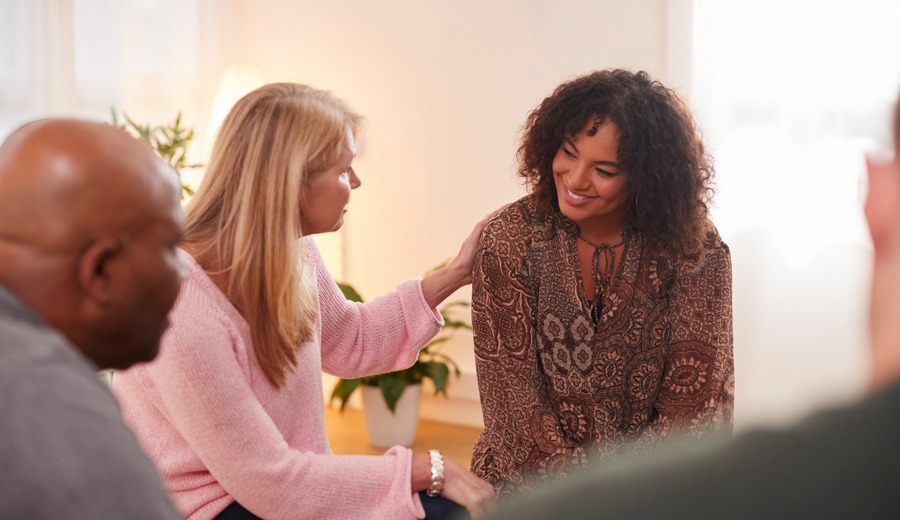The holidays are a time of the year that is jam-packed with celebration, fun, great food, and togetherness. However, in regards to substance abuse, it can be triggering for some individuals. This could be true for a number of reasons. Sometimes an individual might have to relive a tragedy that occurred during the holidays; for others, entering the holiday season just means celebrating with drinking, which can get out of hand quickly.
Whatever the circumstance may be, there’s no denying that the holidays are difficult for those who struggle with drug and alcohol addiction; this is why having a relapse plan for the holidays is imperative to long-term sobriety and stability.
What is Relapse?
Relapse, in the context of drug and alcohol addiction, refers to the return to substance use after a period of abstinence. Despite committed efforts to maintain sobriety, relapse is often a part of the recovery journey. Relapse can be triggered by various factors, including stress, negative emotions, social pressures, and exposure to cues or triggers associated with substance use. It’s crucial for individuals in recovery to identify their personal relapse triggers and develop coping strategies to handle them effectively.
In addition to individual triggers, certain situations or events may increase the risk of relapse. These could include major life changes, such as losing a job or going through a breakup. As previously mentioned, it could also include holidays or celebrations where alcohol or drugs may be present. It’s important for individuals to have a plan in place to deal with these situations and avoid putting themselves in high-risk environments.
It’s important to recognize relapse as a common occurrence rather than a failure. Some may use it as an opportunity to reassess their recovery strategy and seek necessary support. This allows them to continue the journey towards long-term sobriety.
How Common is Relapse?
Relapse is a common occurrence for many individuals on the path to recovery from substance use disorders or mental health conditions. According to data from the National Institute on Drug Abuse, 40% to 60% of individuals in recovery from drug addiction experience at least one relapse.
Similarly, the relapse rates for mental health disorders such as depression and anxiety are also significant. Recent studies suggest that about 50% of individuals will experience a relapse at some point in their lives. It’s essential to understand that relapse is not a sign of failure but rather an indication that treatment needs to be adjusted or intensified.
What Should Be Included in a Holiday Relapse Plan?
A holiday relapse plan should contain several key components to ensure one’s well-being during potentially challenging periods. This includes identifying potential triggers, such as certain people, places, or situations, that might induce stress or evoke cravings.
It’s also essential to list out coping strategies, both psychological and physical, that can be employed when faced with these triggers. This could include deep breathing exercises, meditation, or reaching out to a support network. The plan should include a list of contacts, such as sponsors, therapists, or supportive friends and family, who can be reached out to when needed. Lastly, it’s vital to set clear boundaries and have a plan for leaving a situation if it becomes too overwhelming.
Components of a Relapse Plan
A relapse plan is an essential tool for individuals in recovery from addictions. This plan typically includes several key components:
- Identification of triggers: This involves recognizing the specific situations, emotions, or thoughts that might provoke cravings or impulses to revert to the addictive behavior.
- Coping strategies: These are proactively established methods for dealing with triggers when they arise. They might include mindfulness techniques, physical exercise, or reaching out to a support network.
- Support system contact information: This includes names and contact details of trusted individuals or groups who can provide immediate support during a crisis, such as a therapist, counselor, or support group.
- Self-care practices: These are activities that promote overall well-being and resilience, like adequate sleep, balanced nutrition, and regular exercise.
- Emergency plan: This is a clear, step-by-step process to follow in case of a severe crisis or relapse, detailing when and how to seek professional help.
The holiday season can bring about various triggers for addiction due to its unique set of circumstances. Increased social engagements might lead to higher exposure to substances; the pressure to maintain a cheerful demeanor can result in emotional strain. Additionally, holidays often stir memories, both pleasant and painful. These memories could evoke feelings of nostalgia or grief, potentially triggering addictive behaviors as a coping mechanism.
Why is it Important to Be Aware of Triggers During the Holidays?
During the holiday season, emotional and mental health can be particularly vulnerable due to an array of potential triggers. These triggers can cause stress, anxiety, or depression. They may include increased socialization, financial pressures, excessive food and alcohol, or poignant memories of loved ones who are no longer with us. Being aware of these triggers is crucial as it enables individuals to identify their personal emotional hazards and manage them more effectively. This awareness can foster a healthier, more enjoyable holiday experience.
Triggers present a significant challenge for individuals struggling with substance use disorder. Triggers, often sensory cues or emotional responses tied to past drug or alcohol use, can spark intense cravings, leading to relapse. Such triggers can be internal (ex: stress, anxiety, or depression) or external (ex: certain people, places, or situations associated with past substance use). Recognizing and proactively managing these triggers is a critical component of successful recovery; unaddressed triggers can easily derail even the most determined efforts toward sobriety.
Triggers are not limited to substance use disorder and can affect individuals dealing with a variety of mental health issues. For example, individuals with post-traumatic stress disorder (PTSD) may experience triggers that remind them of past traumatic events. This could result in intense emotional reactions. As a result, a person may cope with drug and alcohol abuse.
When dealing with substance abuse triggers, it’s crucial to have strategies in place. First and foremost, it’s important to recognize your triggers. This could be certain people, places, or emotional states.
Once these have been identified, it’s crucial to develop coping mechanisms. This might involve distancing yourself from trigger-inducing environments; it could also mean seeking support from a trusted friend, family member, or counselor during challenging times. Mindfulness and relaxation techniques, such as deep breathing or yoga, can also be valuable tools in managing triggers. Overall, it’s about finding healthy, non-destructive ways to respond when confronted with potential triggers.
A support network for individuals with substance use disorder should be diverse and encompass various aspects of the individual’s life. This network may include medical professionals such as doctors, psychiatrists, therapists, and counselors who can provide medical treatment and psychological support. Peers in recovery can also play a crucial role, offering understanding and shared experiences.
Maintaining emotional wellness in recovery is a crucial aspect of sustained sobriety. Engaging in regular physical activity, practicing mindfulness, and maintaining a balanced diet can significantly contribute to emotional stability. Additionally, forming healthy relationships, seeking professional help when needed, and prioritizing self-care can also be instrumental. It’s okay to ask for help and take one day at a time; each step forward is a step towards a healthier, more stable life.
Why is Self-Care Important in Preventing Relapse?
Self-care is pivotal in preventing relapse during the holiday season, a time often marked by heightened stress, pressures, and triggers. Practicing self-care helps individuals maintain their mental, emotional, and physical well-being, fortifying them against potential relapses.
Aspects of self-care such as regular exercise, balanced nutrition, and adequate sleep can significantly mitigate the effects of stress. Mindfulness practices can cultivate resilience, helping one remain grounded amidst holiday chaos. That being said, self-care is not merely self-indulgent, but a vital tool in maintaining sobriety throughout the holiday period.
Having an emergency relapse plan during the holidays is crucial for individuals navigating recovery. This period, marked by festivities and social gatherings, may also present a variety of triggers and pressures.
An emergency plan acts as a safeguard, laying out a set of actions and supports to be accessed in challenging times. It can include contact information for immediate support, strategies to manage potential triggers, and activities to keep the individual occupied and focused on their recovery journey. This proactive approach can significantly reduce the risk of relapse, ensuring the individual can fully enjoy the holiday season while maintaining their recovery pathway.
Encouragement and Positivity: Maintaining Hope and Motivation
Maintaining hope and motivation during the holiday season while in recovery can be challenging. Holidays are often filled with festivities and gatherings that may trigger old habits. Yet, it’s essential to remember that recovery is a journey with ups and downs.
Staying focused on your recovery goals and utilizing supportive networks can help you navigate this period with resilience. Practice self-care, engage in holiday activities that bring joy without substance use, and remember that it’s okay to set boundaries. Each day in recovery, even during the holiday season, is a step towards a healthier, happier life.
Acqua Recovery is Here to Empower You This Holiday Season
 At Acqua Recovery, we believe in the power of transformation. As the holiday season approaches, we want to empower you with the tools and resources you need for a journey of healing and self-discovery. Our approach to recovery is designed to help you regain control of your life, offering a personalized path toward wellness. This holiday season, take the first step with Acqua Recovery. You can contact us here.
At Acqua Recovery, we believe in the power of transformation. As the holiday season approaches, we want to empower you with the tools and resources you need for a journey of healing and self-discovery. Our approach to recovery is designed to help you regain control of your life, offering a personalized path toward wellness. This holiday season, take the first step with Acqua Recovery. You can contact us here.












